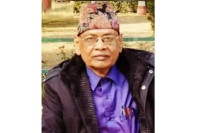Valley
Opinions divided over time limit on parental claim
A clause on parent-child relationship in the Civil Code bill has opinions divided among child-care professionals and experts.
Weena Pun
The first sub-clause says that if a person wants to prove their parental relationship with a parentless child, the person must do so within two years of the child’s birth or within two years of the knowledge of the child’s existence. The second sub-clause says that the paternity suit must be filed within two years of the child’s birth, but is unclear on who the plaintiff should be.
The Muluki Ain does not define parent-child relationships; nor does it have a statute of limitations on laying parental claim on a child.
While the discussion on the proposed bill is yet to take place in Parliament, some believe that the time limit on both the sub-clauses should be lifted altogether as it violates child rights.
Yadav Kumari Basnet, a child rights advocate at Children and Women in Social Services and Human Rights, says that the time restrictions could prevent a child from receiving support and protection from their parents. “Also, it’s a child’s fundamental right to know who their parents are,” says Basnet.
Others say that the deadline should be extended to a few years after the child reaches the age of majority (the legal age when a person can obtain citizenship). The child can then take legal actions themselves.
Tarak Dhital, executive director of Central Child Welfare Board, says, “Right now, the bill discusses parent-child relationship only from the point of view of a parent. The child should be equally empowered to file a case of parent-child relationship.”
The statute of limitations, say experts who want to do away with it, could prove harmful to a child if either of their parents refuses to claim them within the given period. Since the clause is silent on children bringing maternity and paternity cases to court, this will bar the child from inheriting parental property and obtaining citizenship documents later. The constitution currently being drafted proposes that a person can be a Nepali citizen only if both their mother and father are Nepalis.
Statute of limitations are normally written in laws to expedite legal proceedings so that justice is not delayed or withheld for lack of evidence later.
Tek Nath Dhungana, spokesperson for the Ministry of Law, defends the statute of limitations on the clause. He says that it forces a parent to place a claim as early as possible so that the child can enjoy their rights just as early.
“Right now, without such limitations in place, people usually file maternity and (mostly) paternity cases only when it comes to inheritance of ancestral property. This normally means the child is already 16 years of age or older now and grew up without the child support they needed. We want to protect the rights of the child through the statute of limitations,” says Dhungana.




 7.27°C Kathmandu
7.27°C Kathmandu










